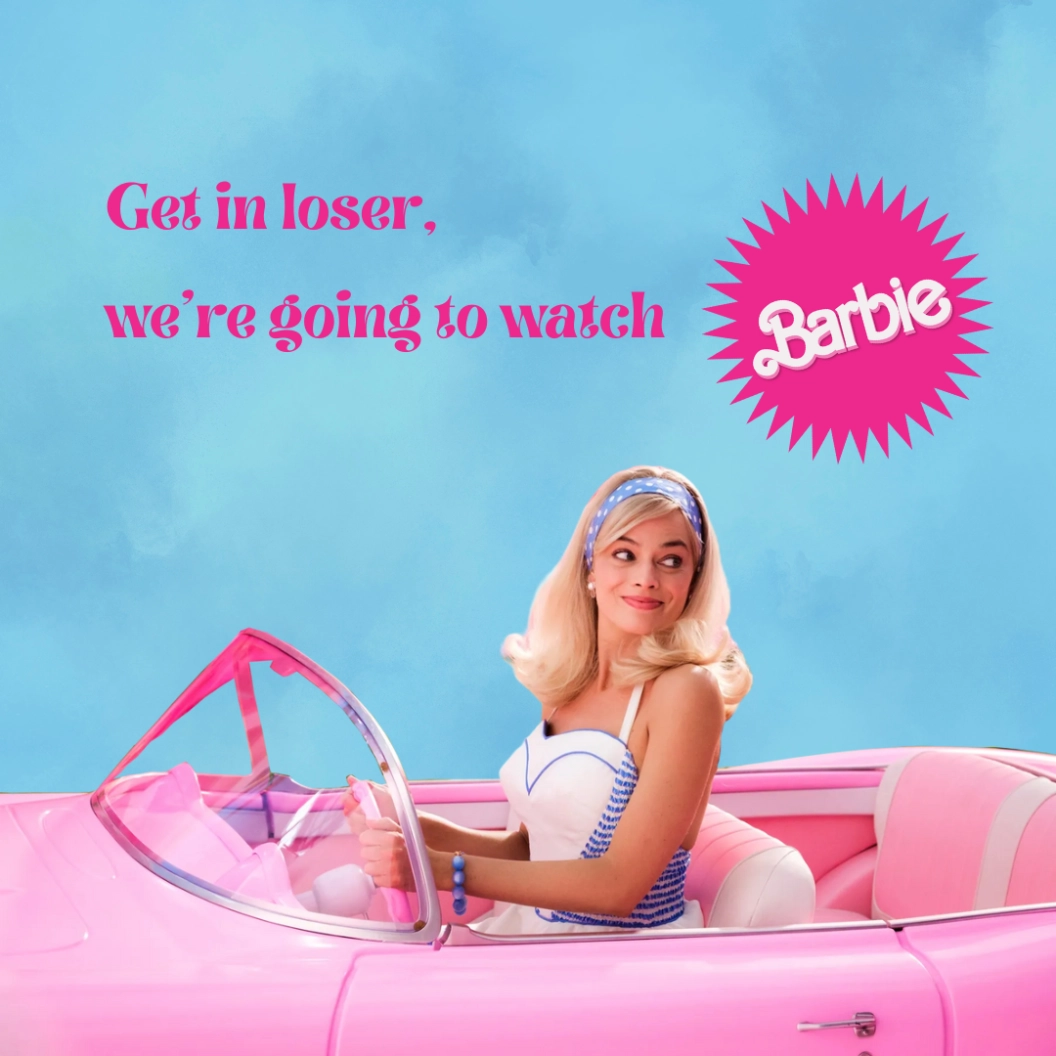Please visit response.fsu.edu for official FSU updates and resources.
Barbie: Feel-Good? Think piece? It can Be Anything.

When I went to watch Barbie this a couple of Fridays ago, there was a line of hot pink going out the door, waiting to get in. Women of all ages and walks of life, even some men as well, were lined up to see this icon on the big screen.
As we got into the theater, I saw a family comprised of two young girls and their mother- taking photos in front of the ‘Barbie Box’ using a self-timer. We were all wearing pink and there was that sense of community that has been missing in a theater for years. “Do you want me to take the picture for you?”, I asked, and I did. Afterward, another young woman offered to take a picture of my friends and me, this cycle continued until the start of the movie.
“Hi Barbie!”, “Hey, Barbie!” I could hear this exchange over and over again in the lobby, if you were wearing pink, you were Barbie. There was such a warm, feminine energy to the whole ordeal that, I believe, made the movie that much better to experience. Inside the actual theater, a sea of pink and quiet chatter grew as we saw every seat fill up and we waited for the previews to start. Older women in blazers and floral dresses, younger women in miniskirts and long acrylic nails, and girls in Barbie tees and ponytails. Men in pink polos. You could see the array of audience and the reach this film had.
Watching the movie felt like a sleepover. Like we were all throwing popcorn at each other and giggling about the shenanigans on screen. Barbie itself was great. It opened with a fantastic, campy reference to 2001: A Space Odyssey that had me giggling in my seat, and it only got better from there. Barbie Land was bright and colorful enough for the kids to be entranced and there were enough entendre-esque jokes to keep the adults entertained. What I think made the movie more than just a bland, pro-status-quo kids film using a beloved character from our childhoods, though, was the quite overt commentary on the state of gender roles and patriarchy’s effect on our world.
Barbie goes through an almost hero’s journey as she is thrust out of her world- Barbie Land- into the ‘real world’ and learns that maybe Barbie didn’t have the all-encompassing fix-it effect that the Barbies thought. She learns of patriarchy, misogyny, and the anxiety and insecurity that womanhood inherently possesses in society today. It’s overwhelming; she feels, for the first time, something other than ‘awesome’ and ‘amazing’.
There is a scene where she looks over to an old woman- and this is the first time she’s seen anyone with wrinkles, everyone in Barbie Land is young and wrinkle-free- and says, “You’re beautiful”. The woman responds with a smile, and “I know!”
It feels hopeful and sweet. Barbie has just had the worst day of her life, but she also gets to see the joys of humanity, and human women. With all their wrinkles marking a long life, all their cellulite- maybe from puberty, or pregnancy- all of their lived experiences. She sees the beauty in that.
Ken, on the other hand, sees all of these men who have such agency, power, and influence- things that he had never even imagined for himself before- and devours it like a man starved. As I was watching, I had to remind myself that Barbie Land was a matriarchy, just as the ‘real world’ is still very much a patriarchy. This was Ken’s first taste of autonomy, being able to be something outside of Barbie.
It was hard to empathize with him at first because he was going through- as my friend crassly put it- his ‘incel era.’ The persona Ken took on after seeing the misogyny in the real world was so reminiscent of men that I have had bad experiences with, but putting his life into perspective made it easier. It also made me question whether or not that was an intentional choice on Gerwig’s part. Men might have an easier time empathizing with Ken, as he is more like them. By paralleling his story with that of women vs the patriarchy was she making a point? A kind of, ‘This is what it’s like, can you imagine it now?’.
When Ken eventually takes the patriarchy back to Barbie Land and wreaks absolute havoc, we see how patriarchy not only negatively impacts women, but men as well. Kens do not allow themselves to be in touch with their emotions, they’re insecure and petty with each other because they don’t communicate, and they still don’t know who they are outside of their Barbies.
Then there’s the scene near the end, set to the Billie Eilish song “What Was I Made For?”. Barbie and Ruth share a touching moment wherein Barbie gets to feel and experience the joys of womanhood as an observer, after experiencing the pains of misogyny. Everyone in this scene is smiling, happy, laughing, and playing. They’re being girls and women. You’re left thinking, ‘How could you ever disrespect them, hate them, objectify them? They’re simply just living.’
With this film, Gerwig executes a masterful- albeit maybe ‘elementary’ to long-time feminists- commentary on not only Barbie’s impact on women, but also larger themes of the patriarchal, misogynistic society we have today, how it hurts men and women, and how it feels to live inside of it, as a woman, every day.
Not only that, but the movie also manages to be incredibly fun and enjoyable with several incredible dance sequences, timely jokes throughout, and a powerhouse cast that seems to just ‘get’ their characters. Not to mention the bop that is “I’m Just Ken” led by Ryan Gosling’s smooth, soulful vocals.
In and of itself Barbie exceeded my expectations in the best way possible. But what made the entire movie-going experience so enjoyably unforgettable were the women in the theater sitting right next to me. Laughing at the same jokes, swaying to the same songs, wearing the same pink.
So hey, Barbie, go see the movie. And don’t forget to wear pink!
Writer: Marlee Gaitanis
Artist: Marlee Gaitanis



